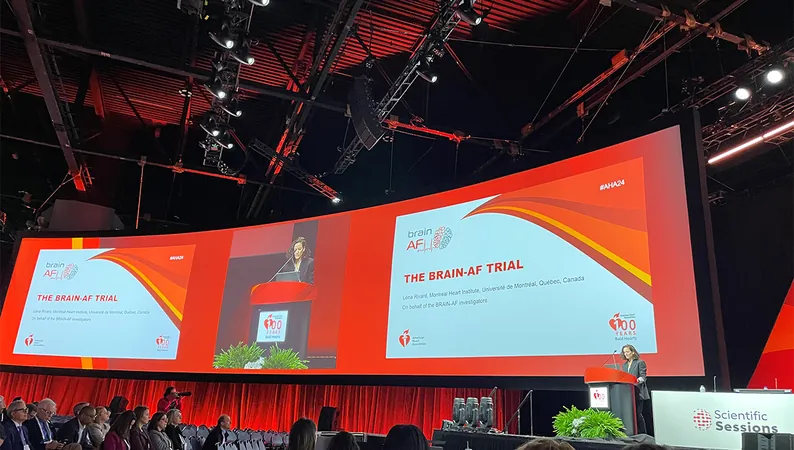
Rivaroxaban Fails to Prevent Cognitive Decline and Stroke in Younger Atrial Fibrillation Patients
2024-11-16
Author: Yu
Groundbreaking Revelation from the BRAIN-AF Trial
In a groundbreaking revelation from the BRAIN-AF trial, researchers discovered that the anticoagulant rivaroxaban (Xarelto; Bayer/Janssen) does not significantly lower the risk of cognitive decline, stroke, or transient ischemic attacks (TIA) in patients under 65 diagnosed with atrial fibrillation (AF). This unexpected finding challenges the previous belief that initiating oral anticoagulation (OAC) could safeguard young adults from neurological complications, similar to its established benefits in older adults with AF.
Presentation at the American Heart Association 2024 Scientific Sessions
Dr. Léna Rivard from the Montreal Heart Institute presented these findings at the American Heart Association 2024 Scientific Sessions, shedding light on a dose of rivaroxaban typically recommended for nonvalvular AF patients. She clarified that neither the standard 20 mg dose nor a reduced dose showed any benefits in preventing cognitive or cerebrovascular issues in this younger cohort, which comprised individuals without additional cardiovascular risk factors.
Details of the BRAIN-AF Trial
The BRAIN-AF trial aimed to enroll over 1,400 participants but was halted prematurely after 1,235 participants were included, as deemed necessary by the data safety and monitoring committee. The results indicated that 234 participants experienced cognitive decline—measured by the Montreal Cognitive Assessment (MoCA)—while there were only 13 strokes and 9 TIAs reported. However, statistical analysis revealed no significant difference between the rivaroxaban group and the placebo, with a hazard ratio of 1.10 (95% CI 0.86-1.40).
Concerns Raised About Cognitive Decline
Despite the expectation that anticoagulation could mitigate neurocognitive decline, Dr. Rivard noted the alarming statistic that approximately 18% of participants exhibited a marked cognitive decline, raising concerns about the underlying relationship between AF and cognitive health. "We are trying to understand why younger individuals without traditional risk factors are experiencing such declines," she stated.
Experts Emphasize Need for Further Research
Experts discussing the trial's results emphasized the need for further research into the cognitive impacts of AF. Dr. Andrea Russo highlighted that while the study did not support OAC prescriptions in this demographic, it paved the way for new studies focusing on cognitive decline as a critical endpoint for clinical trials. "Understanding the mechanisms affecting brain health in AF patients may lead to innovative treatment approaches," she remarked.
The Urgent Need for Comprehensive Understanding
Dr. Sana Al-Khatib pointed out that while strokes remain a primary concern for many patients, there is an urgent need to comprehend the cognitive implications of AF. "We need to explore the best strategies to address cognitive decline in these patients," she noted.
Ongoing Research and Future Investigations
As the BRAIN-AF investigators continue to analyze their data, they hope to uncover more about the predictors of cognitive decline. Dr. Rivard mentioned that ongoing research will also look into MRI data, biomarkers, and genetic information from participants to gain deeper insights.
Implications of the BRAIN-AF Study
This research not only challenges the current treatment paradigm for younger AF patients but also calls for a broader understanding of AF's complex relationship with neurological health. Dr. Hooman Kamel emphasized that expanding anticoagulation indications to generally healthy, younger patients is not justified based on this study's findings. He urged for enhanced investigation into alternative therapies that could address cognitive health and improve brain function alongside traditional stroke prevention efforts.
Conclusion: A Turning Point in AF Research
The BRAIN-AF study serves as a critical turning point in understanding how atrial fibrillation affects not only cardiovascular health but also cognitive abilities, emphasizing the need for a multifaceted approach to treating and studying AF in the future. Stay tuned for further updates as more data and analyses emerge from this pivotal research.



 Brasil (PT)
Brasil (PT)
 Canada (EN)
Canada (EN)
 Chile (ES)
Chile (ES)
 España (ES)
España (ES)
 France (FR)
France (FR)
 Hong Kong (EN)
Hong Kong (EN)
 Italia (IT)
Italia (IT)
 日本 (JA)
日本 (JA)
 Magyarország (HU)
Magyarország (HU)
 Norge (NO)
Norge (NO)
 Polska (PL)
Polska (PL)
 Schweiz (DE)
Schweiz (DE)
 Singapore (EN)
Singapore (EN)
 Sverige (SV)
Sverige (SV)
 Suomi (FI)
Suomi (FI)
 Türkiye (TR)
Türkiye (TR)